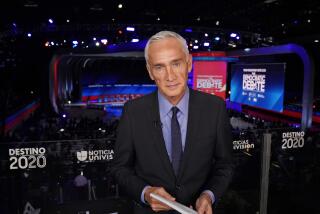TV drama will play out in court
- Share via
Some of the best Spanish-language television dramas delve into the ambitions and rancorous relationships within powerful Latino families.
Instead of playing each night on TV screens, though, this tale of a tumultuous 16-year marriage, fraught with allegations of treachery and bad faith, will begin to unfold this week in a federal courtroom in Los Angeles.
Grupo Televisa -- the Mexico City-based entertainment conglomerate that is the world’s preeminent producer of sensational Spanish-language soap operas, or telenovelas -- claims in a suit filed three years ago that it has been cheated out of more than $100 million in royalties by its partner, Univision Communications Inc.
The trial is set to begin Tuesday, pitting Televisa’s 40-year-old media scion Emilio Azcarraga Jean against Univision’s new owners, led by Los Angeles billionaire Haim Saban, the company’s chairman. Televisa is demanding that it be allowed to sever all ties with Univision, which has become the dominant Spanish-language broadcaster in the U.S. largely because it can run Televisa’s popular programming.
“It comes down to who needs who more,” said Julio Rumbaut, a Miami-based media consultant. “Televisa has a unique product that they just keep cranking out, and it works well on the West Coast, the East Coast and in Puerto Rico.”
Last year, advertising generated by Televisa programming represented $538 million of Univision’s overall $2.1 billion in net revenue. Univision paid Televisa license fees of approximately $145 million.
In court filings, Televisa alleges that Univision managers tried to conceal financial figures to frustrate Televisa executives and auditors as they tried to trace the money trail. Their behavior was so egregious, Televisa contends, that Televisa should be allowed to end its long-term programming agreement, which obligates the company to provide Univision with its wildly popular soap operas through December 2017.
If the agreement were terminated, Televisa could demand much higher fees for its shows. It could perhaps use its leverage to regain an ownership stake in Univision. Azcarraga’s late grandfather helped launch Univision 47 years ago, with the purchase of a TV station in San Antonio.
Televisa also could end its involvement with Univision entirely and sell its programs to its smaller rival, NBC Universal’s Telemundo or hook up with another partner to form a broadcast network. Televisa’s goal has long been to gain a bigger piece of the lucrative U.S. media market.
Any of those outcomes would leave Univision’s new owners in the lurch.
A year ago, a group of private investors, including Saban, acquired Univision in a highly leveraged $13.7-billion deal that took the company private and saddled it with $10 billion of debt.
“If Televisa were to stop providing us programming for any reason, it could be difficult to develop or acquire replacement programming of comparable quality whether on similar terms or at all,” Univision wrote last month in a regulatory filing. That, the company warned, “would have a material adverse effect on our results.”
The trial, which could span four weeks, is expected to include as witnesses Azcarraga, the chief executive of Televisa, key executives from both sides and videotaped testimony of Univision’s 77-year-old former CEO, billionaire A. Jerrold Perenchio, the architect of the long-term programming agreement.
“We are confident that the facts are on our side and that Univision will prevail at trial once we present our case,” Univision said in a statement. The company has paid, under protest, about $20 million to Televisa to settle some of the disputed claims.
Univision, in its court filings, rejects the claims outlined in Televisa’s original 2005 lawsuit and an amended 2006 complaint, which leveled the more serious allegations of deception and material breach.
“What started out as a vanilla claim for damages has evolved into a claim of coverup, bad faith and conduct unbecoming a partner,” said Marshall Grossman, Televisa’s lead attorney.
The trial is expected to explore the origins of the 1992 programming agreement. That deal came about when Perenchio teamed up with Azcarraga’s late father, Emilio Azcarraga Milmo, and a Venezuelan media magnate to buy Univision from Hallmark Cards Inc.
The three partners paid $550 million for Univision, each chipping in $33 million of their own money. With Perenchio at the helm and an abundant supply of the steamy Televisa telenovelas, Univision became a juggernaut. The shows appeal to Mexican immigrants and Mexican Americans who make up an estimated two-thirds of the U.S. Latino population.
Azcarraga took over Televisa a month before his father died in 1997. He was just 29. Within a few years, Azcarraga’s relations with Perenchio had soured. The young mogul has long felt that Perenchio took advantage of his father with the 25-year programming agreement, and that Univision has not adequately compensated Televisa for its popular shows.
Tensions heightened in 2005 when Perenchio installed his longtime lieutenant, Ray Rodriguez, as president of Univision without conducting a formal search. Azcarraga resigned from Univision’s board. The lawsuit was filed a few months later.
In 2006, Perenchio decided to sell Univision. Televisa figured that the time had finally come for it to gain control of the company that it helped build.
But Televisa was outbid by Saban Capital Group and four private equity firms: Texas Pacific Group, Providence Equity Partners, Madison Dearborn Partners and Thomas H. Lee Partners.
Perenchio, Televisa and Venezuela’s Venevision each cashed out with $1.3 billion when the deal closed last year.
Televisa declined an invitation by Univision’s new owners to roll over its investment in Univision and remain an equity partner. Televisa gambled on the lawsuit instead.
“It’s very difficult to predict a divorce between Televisa and Univision because they need each other,” said Manny Gonzalez, managing director of advertising firm Hill Holliday Hispanic. “Clearly Univision’s strong ratings come from Televisa’s programming, and Televisa needs Univision for the revenue. . . . They are caught in a pickle.”
--
More to Read
Sign up for Essential California
The most important California stories and recommendations in your inbox every morning.
You may occasionally receive promotional content from the Los Angeles Times.











